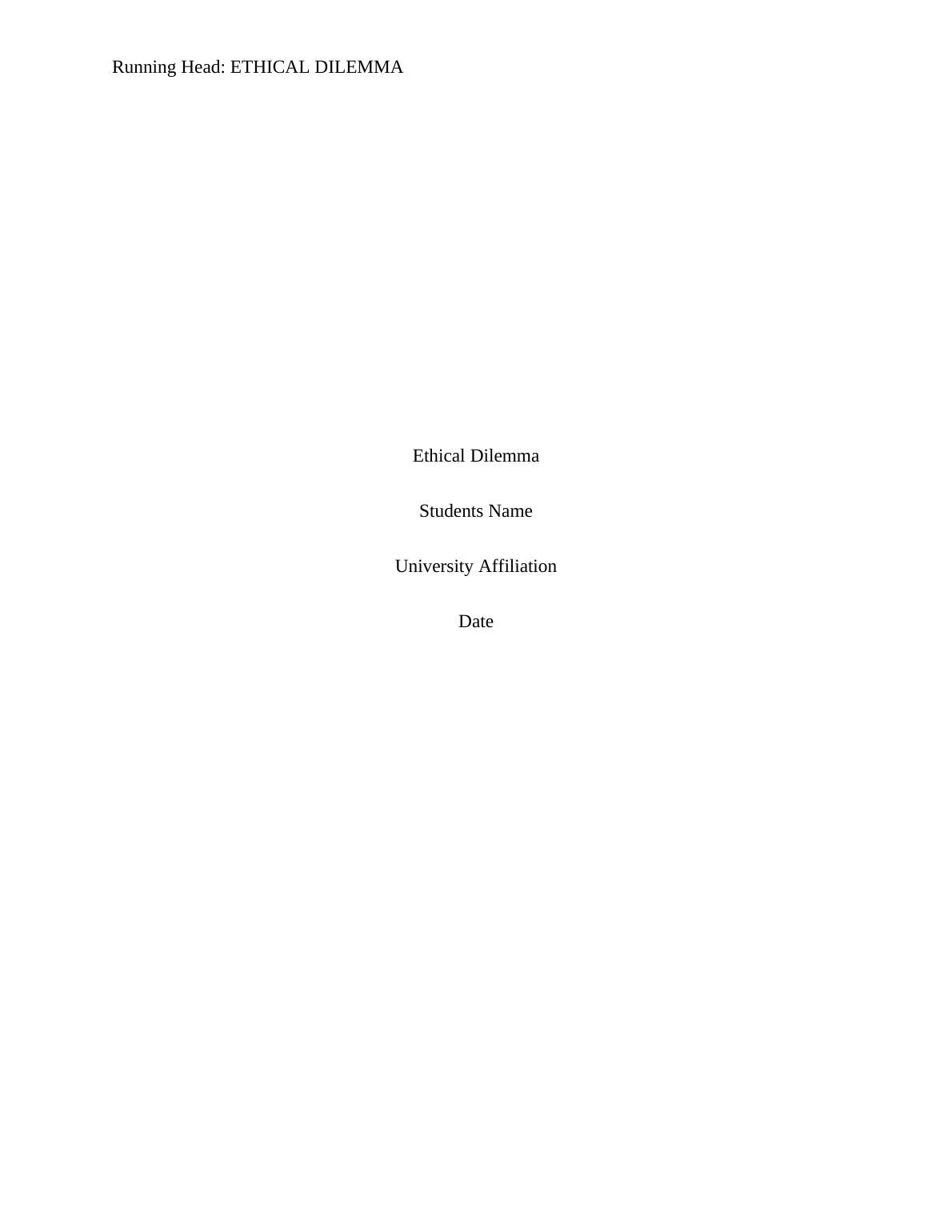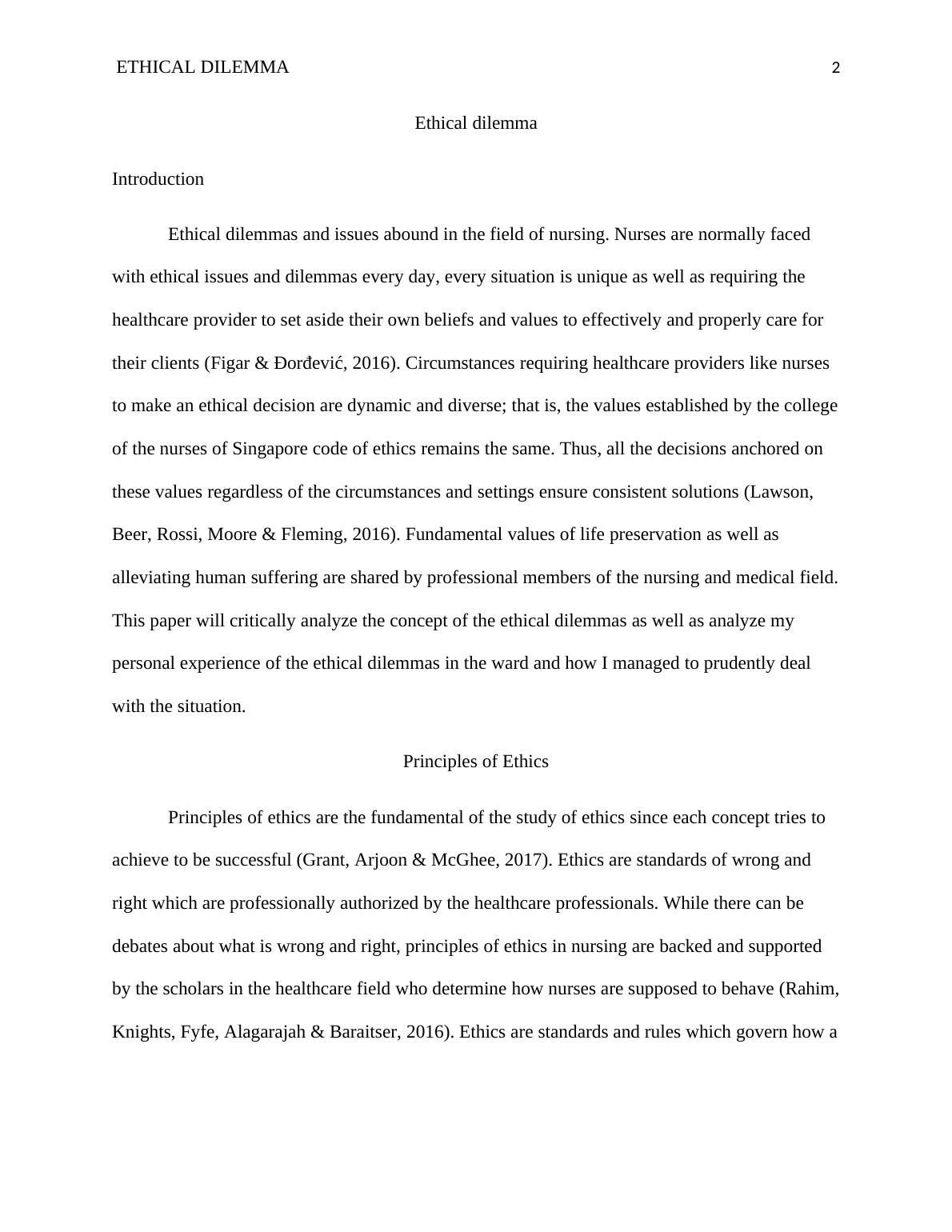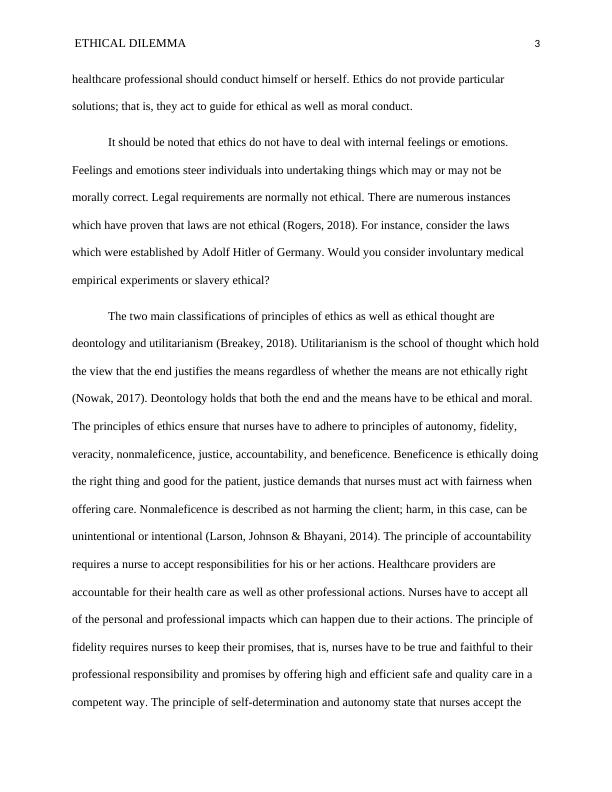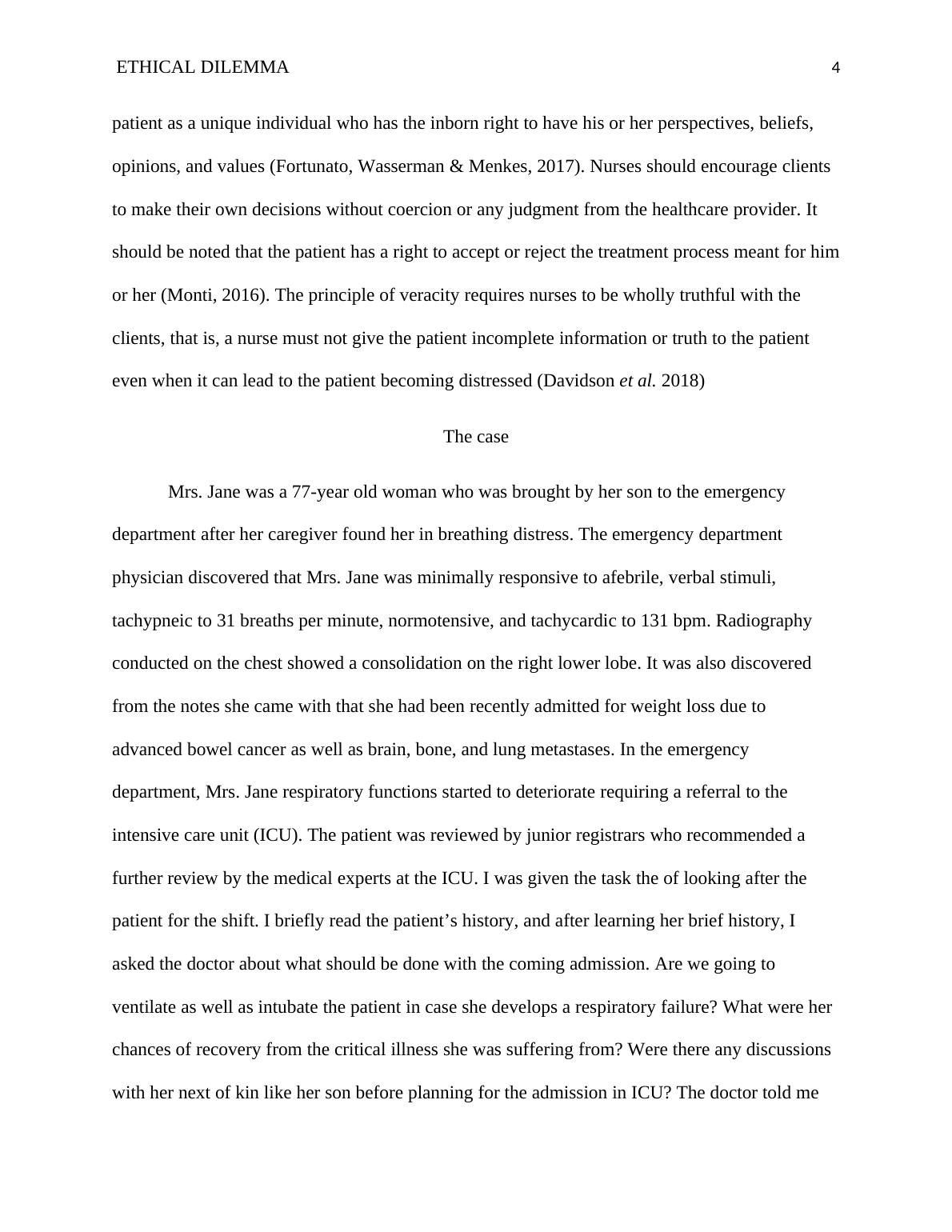Ethical Dilemma in Nursing
Added on 2023-04-08
11 Pages2626 Words296 Views
Running Head: ETHICAL DILEMMA
Ethical Dilemma
Students Name
University Affiliation
Date
Ethical Dilemma
Students Name
University Affiliation
Date

ETHICAL DILEMMA 2
Ethical dilemma
Introduction
Ethical dilemmas and issues abound in the field of nursing. Nurses are normally faced
with ethical issues and dilemmas every day, every situation is unique as well as requiring the
healthcare provider to set aside their own beliefs and values to effectively and properly care for
their clients (Figar & Đorđević, 2016). Circumstances requiring healthcare providers like nurses
to make an ethical decision are dynamic and diverse; that is, the values established by the college
of the nurses of Singapore code of ethics remains the same. Thus, all the decisions anchored on
these values regardless of the circumstances and settings ensure consistent solutions (Lawson,
Beer, Rossi, Moore & Fleming, 2016). Fundamental values of life preservation as well as
alleviating human suffering are shared by professional members of the nursing and medical field.
This paper will critically analyze the concept of the ethical dilemmas as well as analyze my
personal experience of the ethical dilemmas in the ward and how I managed to prudently deal
with the situation.
Principles of Ethics
Principles of ethics are the fundamental of the study of ethics since each concept tries to
achieve to be successful (Grant, Arjoon & McGhee, 2017). Ethics are standards of wrong and
right which are professionally authorized by the healthcare professionals. While there can be
debates about what is wrong and right, principles of ethics in nursing are backed and supported
by the scholars in the healthcare field who determine how nurses are supposed to behave (Rahim,
Knights, Fyfe, Alagarajah & Baraitser, 2016). Ethics are standards and rules which govern how a
Ethical dilemma
Introduction
Ethical dilemmas and issues abound in the field of nursing. Nurses are normally faced
with ethical issues and dilemmas every day, every situation is unique as well as requiring the
healthcare provider to set aside their own beliefs and values to effectively and properly care for
their clients (Figar & Đorđević, 2016). Circumstances requiring healthcare providers like nurses
to make an ethical decision are dynamic and diverse; that is, the values established by the college
of the nurses of Singapore code of ethics remains the same. Thus, all the decisions anchored on
these values regardless of the circumstances and settings ensure consistent solutions (Lawson,
Beer, Rossi, Moore & Fleming, 2016). Fundamental values of life preservation as well as
alleviating human suffering are shared by professional members of the nursing and medical field.
This paper will critically analyze the concept of the ethical dilemmas as well as analyze my
personal experience of the ethical dilemmas in the ward and how I managed to prudently deal
with the situation.
Principles of Ethics
Principles of ethics are the fundamental of the study of ethics since each concept tries to
achieve to be successful (Grant, Arjoon & McGhee, 2017). Ethics are standards of wrong and
right which are professionally authorized by the healthcare professionals. While there can be
debates about what is wrong and right, principles of ethics in nursing are backed and supported
by the scholars in the healthcare field who determine how nurses are supposed to behave (Rahim,
Knights, Fyfe, Alagarajah & Baraitser, 2016). Ethics are standards and rules which govern how a

ETHICAL DILEMMA 3
healthcare professional should conduct himself or herself. Ethics do not provide particular
solutions; that is, they act to guide for ethical as well as moral conduct.
It should be noted that ethics do not have to deal with internal feelings or emotions.
Feelings and emotions steer individuals into undertaking things which may or may not be
morally correct. Legal requirements are normally not ethical. There are numerous instances
which have proven that laws are not ethical (Rogers, 2018). For instance, consider the laws
which were established by Adolf Hitler of Germany. Would you consider involuntary medical
empirical experiments or slavery ethical?
The two main classifications of principles of ethics as well as ethical thought are
deontology and utilitarianism (Breakey, 2018). Utilitarianism is the school of thought which hold
the view that the end justifies the means regardless of whether the means are not ethically right
(Nowak, 2017). Deontology holds that both the end and the means have to be ethical and moral.
The principles of ethics ensure that nurses have to adhere to principles of autonomy, fidelity,
veracity, nonmaleficence, justice, accountability, and beneficence. Beneficence is ethically doing
the right thing and good for the patient, justice demands that nurses must act with fairness when
offering care. Nonmaleficence is described as not harming the client; harm, in this case, can be
unintentional or intentional (Larson, Johnson & Bhayani, 2014). The principle of accountability
requires a nurse to accept responsibilities for his or her actions. Healthcare providers are
accountable for their health care as well as other professional actions. Nurses have to accept all
of the personal and professional impacts which can happen due to their actions. The principle of
fidelity requires nurses to keep their promises, that is, nurses have to be true and faithful to their
professional responsibility and promises by offering high and efficient safe and quality care in a
competent way. The principle of self-determination and autonomy state that nurses accept the
healthcare professional should conduct himself or herself. Ethics do not provide particular
solutions; that is, they act to guide for ethical as well as moral conduct.
It should be noted that ethics do not have to deal with internal feelings or emotions.
Feelings and emotions steer individuals into undertaking things which may or may not be
morally correct. Legal requirements are normally not ethical. There are numerous instances
which have proven that laws are not ethical (Rogers, 2018). For instance, consider the laws
which were established by Adolf Hitler of Germany. Would you consider involuntary medical
empirical experiments or slavery ethical?
The two main classifications of principles of ethics as well as ethical thought are
deontology and utilitarianism (Breakey, 2018). Utilitarianism is the school of thought which hold
the view that the end justifies the means regardless of whether the means are not ethically right
(Nowak, 2017). Deontology holds that both the end and the means have to be ethical and moral.
The principles of ethics ensure that nurses have to adhere to principles of autonomy, fidelity,
veracity, nonmaleficence, justice, accountability, and beneficence. Beneficence is ethically doing
the right thing and good for the patient, justice demands that nurses must act with fairness when
offering care. Nonmaleficence is described as not harming the client; harm, in this case, can be
unintentional or intentional (Larson, Johnson & Bhayani, 2014). The principle of accountability
requires a nurse to accept responsibilities for his or her actions. Healthcare providers are
accountable for their health care as well as other professional actions. Nurses have to accept all
of the personal and professional impacts which can happen due to their actions. The principle of
fidelity requires nurses to keep their promises, that is, nurses have to be true and faithful to their
professional responsibility and promises by offering high and efficient safe and quality care in a
competent way. The principle of self-determination and autonomy state that nurses accept the

ETHICAL DILEMMA 4
patient as a unique individual who has the inborn right to have his or her perspectives, beliefs,
opinions, and values (Fortunato, Wasserman & Menkes, 2017). Nurses should encourage clients
to make their own decisions without coercion or any judgment from the healthcare provider. It
should be noted that the patient has a right to accept or reject the treatment process meant for him
or her (Monti, 2016). The principle of veracity requires nurses to be wholly truthful with the
clients, that is, a nurse must not give the patient incomplete information or truth to the patient
even when it can lead to the patient becoming distressed (Davidson et al. 2018)
The case
Mrs. Jane was a 77-year old woman who was brought by her son to the emergency
department after her caregiver found her in breathing distress. The emergency department
physician discovered that Mrs. Jane was minimally responsive to afebrile, verbal stimuli,
tachypneic to 31 breaths per minute, normotensive, and tachycardic to 131 bpm. Radiography
conducted on the chest showed a consolidation on the right lower lobe. It was also discovered
from the notes she came with that she had been recently admitted for weight loss due to
advanced bowel cancer as well as brain, bone, and lung metastases. In the emergency
department, Mrs. Jane respiratory functions started to deteriorate requiring a referral to the
intensive care unit (ICU). The patient was reviewed by junior registrars who recommended a
further review by the medical experts at the ICU. I was given the task the of looking after the
patient for the shift. I briefly read the patient’s history, and after learning her brief history, I
asked the doctor about what should be done with the coming admission. Are we going to
ventilate as well as intubate the patient in case she develops a respiratory failure? What were her
chances of recovery from the critical illness she was suffering from? Were there any discussions
with her next of kin like her son before planning for the admission in ICU? The doctor told me
patient as a unique individual who has the inborn right to have his or her perspectives, beliefs,
opinions, and values (Fortunato, Wasserman & Menkes, 2017). Nurses should encourage clients
to make their own decisions without coercion or any judgment from the healthcare provider. It
should be noted that the patient has a right to accept or reject the treatment process meant for him
or her (Monti, 2016). The principle of veracity requires nurses to be wholly truthful with the
clients, that is, a nurse must not give the patient incomplete information or truth to the patient
even when it can lead to the patient becoming distressed (Davidson et al. 2018)
The case
Mrs. Jane was a 77-year old woman who was brought by her son to the emergency
department after her caregiver found her in breathing distress. The emergency department
physician discovered that Mrs. Jane was minimally responsive to afebrile, verbal stimuli,
tachypneic to 31 breaths per minute, normotensive, and tachycardic to 131 bpm. Radiography
conducted on the chest showed a consolidation on the right lower lobe. It was also discovered
from the notes she came with that she had been recently admitted for weight loss due to
advanced bowel cancer as well as brain, bone, and lung metastases. In the emergency
department, Mrs. Jane respiratory functions started to deteriorate requiring a referral to the
intensive care unit (ICU). The patient was reviewed by junior registrars who recommended a
further review by the medical experts at the ICU. I was given the task the of looking after the
patient for the shift. I briefly read the patient’s history, and after learning her brief history, I
asked the doctor about what should be done with the coming admission. Are we going to
ventilate as well as intubate the patient in case she develops a respiratory failure? What were her
chances of recovery from the critical illness she was suffering from? Were there any discussions
with her next of kin like her son before planning for the admission in ICU? The doctor told me

End of preview
Want to access all the pages? Upload your documents or become a member.
Related Documents
Ethics in Medical Care: A Deontological Approachlg...
|5
|1071
|276
Ethics in Health and Social Care: Philosophical Approach, Moral Principles, and Practical Issueslg...
|8
|2071
|67
Principles Of Healthcare Ethicslg...
|5
|1398
|37
ASSIGNMENT ON THE BIOETHICSlg...
|5
|715
|22
Ethics, Ethical Frameworks and Legislation in Healthcare: A Case Study of Makayla Saultlg...
|10
|3759
|400
Ethical Principles of Nursing and Application | Stepslg...
|7
|2012
|25
